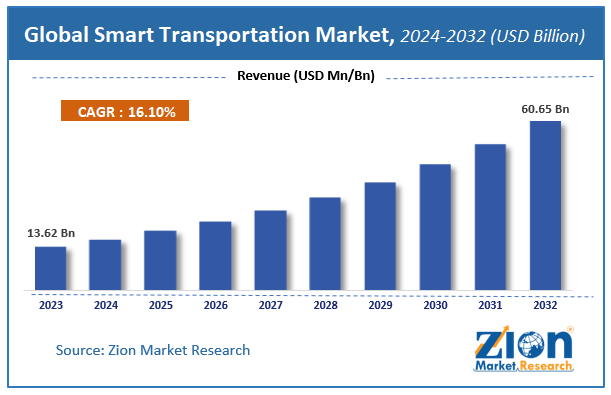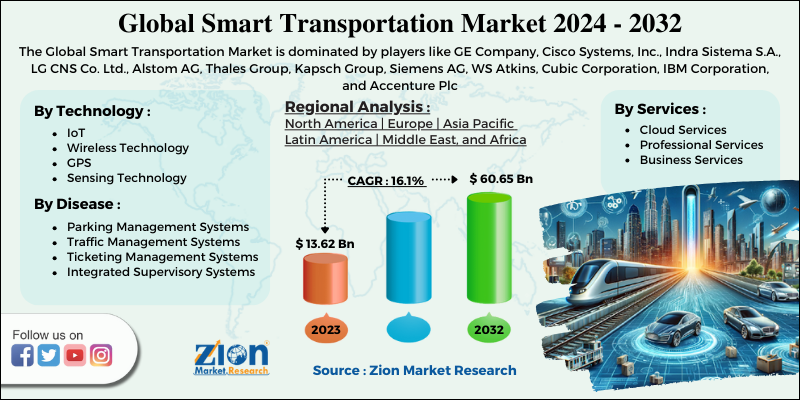Smart Transportation Market Size, Share, Growth, Trends, and Forecast 2032

Smart Transportation Market - By Technology (IoT, Wireless Technology, GPS, and Sensing Technology), By Services (Cloud Services, Business Services, and Professional Services) And By Solutions (Parking Management Systems, Traffic Management Systems, Ticketing Management Systems, and Integrated Supervisory Systems): Global Industry Perspective, Comprehensive Analysis And Forecast, 2024-2032
| Market Size in 2023 | Market Forecast in 2032 | CAGR (in %) | Base Year |
|---|---|---|---|
| USD 13.62 Billion | USD 60.65 Billion | 16.1% | 2023 |
Smart Transportation Market Insights
According to Zion Market Research, the global Smart Transportation Market was worth USD 13.62 Billion in 2023. The market is forecast to reach USD 60.65 Billion by 2032, growing at a compound annual growth rate (CAGR) of 16.1% during the forecast period 2024-2032.
The report offers a comprehensive analysis of the market, highlighting the factors that will determine growth, potential challenges, and opportunities that could emerge in the Smart Transportation Market industry over the next decade.
Smart Transportation Market Size
The report offers assessment and analysis of the Smart Transportation Market on a global and regional level. The study offers a comprehensive assessment of the market competition, constraints, revenue estimates, opportunities, evolving trends, and industry-validated data. The report provides historical data from 2018 to 2022 along with a forecast from 2024 to 2032 based on revenue (USD Billion).
Smart Transportation Market: Overview
Smart transportation is key for creating smart cities and ridesharing, use of electric vehicles, & on-demand mobility have contributed massively towards growth of smart transportation activities along with creation of smart cities. Furthermore, emergence as well as ubiquity of car sharing services and latter being a niche transportation alternative for particular demographic population is predicted to create new growth avenues for smart transportation business.
Moreover, modernization of technologies utilized in ridesharing transportation with a view of filling empty passenger seats will pave a way for humungous demand for smart transportation modes in coming years. Innovations witnessed in transportation sector and high traffic congestion has restricted mobility in urban areas across globe, thereby resulting in expansion of mobility ecosystems through high investments in transport. This, in turn, is predicted to drive growth of smart transportation market.
Smart Transportation Market: Growth Factors
Increase in preference for car sharing and inception of industry 4.0 revolution is predicted to create huge demand for proficient transportation services, thereby steering growth of smart transportation market. Additionally, end-user inclination towards ride sharing and less vehicle ownership is projected to result in low fuel emissions & traffic jams as well as road collisions, thereby boosting market trends. Reportedly, connected vehicles are becoming more popular in developed countries with vehicle manufacturers focusing more on embed in-built software components in vehicles. This is predicted to help cars function like smartphones and offer air connectivity, upgradability, and enhancing productivity for commuters. These moves are anticipated to not only boost use of connected automotive but will also facilitate expansion of smart transportation market size.
Furthermore, autonomous cars are projected to witness surge in sales over next few years and help in reducing parking problems and pollution issues, thereby enlarging scope of business growth. Additionally, shared mobility is slated to account for nearly 16% of urban travels by 2035. With large investments made by government and private firms in setting up of electric charging stations, electric vehicles are today considered to be most viable alternative for curbing fuel emission along with reducing greenhouse effects. Apart from this, government is focusing on reducing electric battery costs along with providing incentives on EV purchase. All these aspects will create strong growth foundations for smart transportation market.
Smart Transportation Market: Regional Landscape
North America To Dominate Smart Transportation Market Size By 2032
High growth of smart transportation market in North America over anticipated timespan is subject to growing funding by government for erecting strong transport infrastructure in countries such as the U.S. In addition to this, incorporation of sensing technology by vehicle manufacturers for avoiding road collisions and use of collision warning systems by traffic authorities in region will boost smart transportation market growth in North America.
Apparently, use of smart cards and electronic license plates have assisted transport authorities in effectively collecting toll charges in countries such as the U.S. and Canada, thereby steering growth of smart transportation industry in North America. Increase in use of hybrid and electric vehicles in Canada and the U.S. will enhance regional market size in span of next few years. Rise in smart mobility activities in the U.S. will promulgate market expansion in sub-continent.
Smart Transportation Market: Report Scope
| Report Attributes | Report Details |
|---|---|
| Report Name | Smart Transportation Market |
| Market Size in 2023 | USD 13.62 Billion |
| Market Forecast in 2032 | USD 60.65 Billion |
| Growth Rate | CAGR of 16.1% |
| Number of Pages | 215 |
| Key Companies Covered | GE Company, Cisco Systems, Inc., Indra Sistema S.A., LG CNS Co. Ltd., Alstom AG, Thales Group, Kapsch Group, Siemens AG, WS Atkins, Cubic Corporation, IBM Corporation, and Accenture Plc |
| Segments Covered | By Technology, By Disease Type, By Services and By Region |
| Regions Covered | North America, Europe, Asia Pacific (APAC), Latin America, Middle East, and Africa (MEA) |
| Base Year | 2023 |
| Historical Year | 2018 to 2022 |
| Forecast Year | 2024 - 2032 |
| Customization Scope | Avail customized purchase options to meet your exact research needs. Request For Customization |
Smart Transportation Market: Competitive Landscape
Key players leveraging growth of smart transportation industry space and profiled in report are -
- GE Company
- Cisco Systems
- Indra Sistema S.A.
- LG CNS Co. Ltd.
- Alstom AG
- Thales Group
- Kapsch Group
- Siemens AG
- WS Atkins
- Cubic Corporation
- IBM Corporation
- Accenture Plc.
The global Smart Transportation Market is segmented as follows:
By Technology
- IoT
- Wireless Technology
- GPS
- Sensing Technology
By Disease Type
- Parking Management Systems
- Traffic Management Systems
- Ticketing Management Systems
- Integrated Supervisory Systems
By Services
- Cloud Services
- Professional Services
- Business Services
By Region
- North America
- The U.S.
- Canada
- Europe
- France
- The UK
- Spain
- Germany
- Italy
- Rest of Europe
- Asia Pacific
- China
- Japan
- India
- South Korea
- Southeast Asia
- Rest of Asia Pacific
- Latin America
- Brazil
- Mexico
- Rest of Latin America
- Middle East & Africa
- GCC
- South Africa
- Rest of Middle East & Africa
Table Of Content
Methodology
FrequentlyAsked Questions
Increase in preference for car sharing and inception of industry 4.0 revolution is predicted to create huge demand for proficient transportation services, thereby steering growth of smart transportation market. Additionally, end-user inclination towards ride sharing and less vehicle ownership is projected to result in low fuel emissions & traffic jams as well as road collisions, thereby boosting market trends. Reportedly, connected vehicles are becoming more popular in developed countries with vehicle manufacturers focusing more on embed in-built software components in vehicles. This is predicted to help cars function like smartphones and offer air connectivity, upgradability, and enhancing productivity for commuters. These moves are anticipated to not only boost use of connected automotive but will also facilitate expansion of smart transportation market size. Furthermore, autonomous cars are projected to witness surge in sales over next few years and help in reducing parking problems and pollution issues, thereby enlarging scope of business growth.
Smart Transportation Market size is set to expand from $ 13.62 Billion in 2023 to $ 60.65 Billion by 2032, with an anticipated CAGR of around 16.1% from 2024 to 2032.
North America will contribute lucratively towards the global market earnings over the projected timeline. The regional market surge is subject to growing funding by government for erecting strong transport infrastructure in countries such as the U.S. In addition to this, incorporation of sensing technology by vehicle manufacturers for avoiding road collisions and use of collision warning systems by traffic authorities in region will boost smart transportation market growth in North America. Apparently, use of smart cards and electronic license plates have assisted transport authorities in effectively collecting toll charges in countries such as the U.S. and Canada, thereby steering growth of smart transportation industry in North America. Increase in use of hybrid and electric vehicles in Canada and the U.S. will enhance regional market size in span of next few years. Rise in smart mobility activities in the U.S. will promulgate market expansion in sub-continent.
The key market participants include GE Company, Cisco Systems, Inc., Indra Sistema S.A., LG CNS Co. Ltd., Alstom AG, Thales Group, Kapsch Group, Siemens AG, WS Atkins, Cubic Corporation, IBM Corporation, and Accenture Plc.
RelatedNews
HappyClients
Zion Market Research
Tel: +1 (302) 444-0166
USA/Canada Toll Free No.+1 (855) 465-4651
3rd Floor,
Mrunal Paradise, Opp Maharaja Hotel,
Pimple Gurav, Pune 411061,
Maharashtra, India
Phone No +91 7768 006 007, +91 7768 006 008
US OFFICE NO +1 (302) 444-0166
US/CAN TOLL FREE +1 (855) 465-4651
Email: sales@zionmarketresearch.com
We have secured system to process your transaction.
Our support available to help you 24 hours a day, five days a week.
Monday - Friday: 9AM - 6PM
Saturday - Sunday: Closed






